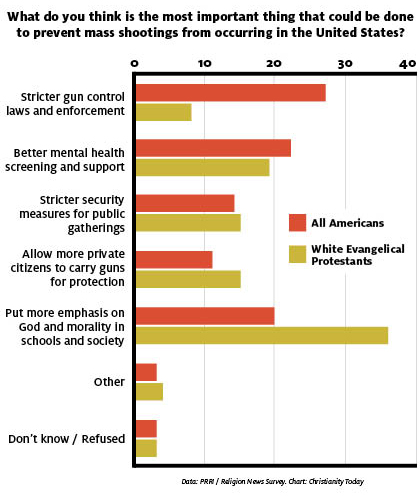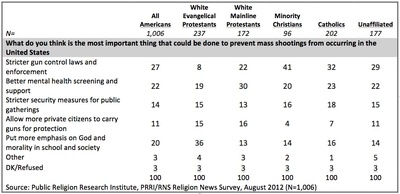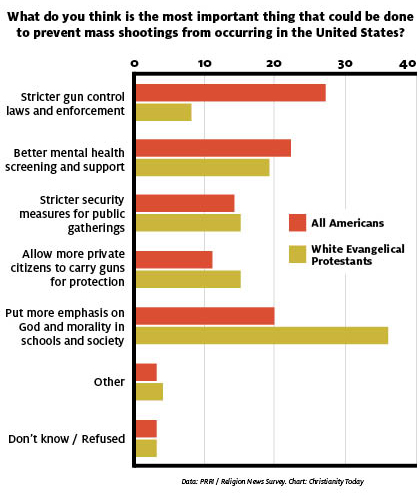Update (Jan. 24): According to new research from PRRI, 30 percent of Americans now say that better mental health screening and support is the best way to prevent mass shootings from occurring in the United States–an eight-point increase over data collected before December's Sandy Hook shooting.
PRRI also reports that "most major religious groups in the country favor stricter gun control laws, including majorities of minority Protestants such as black Americans (76%), Catholics (67%), religiously unaffiliated Americans (60%), and white mainline Protestants (57%)."
Yet, white evangelical Protestants stand out as the group least likely to support stricter gun control laws (38% favor, 59% oppose). In addition, they are are the only religious group "in which a plurality (40%) say that putting more emphasis on God and morality in school and society is the most important thing that could be done to prevent future mass shootings."
_________________________________________
December 19, 2012: In Sandy Hook Debate over Gun Control vs. Mental Health, Evangelicals Diverge from Rest of Nation

As nationwide mourning over last week's massacre of 20 first graders at Sandy Hook Elementary gives way to debate over how to prevent future tragedies, two main subjects have emerged: better gun control vs. better treatment of mental illness.
Both sides have vocal advocates. And a recent survey of attitudes toward gun control suggests where evangelicals, Catholics, and other religious groups stand on the issue.
In August, Public Religion Research Institute (PRRI) and Religion News Service (RNS) surveyed more than 1,000 Americans regarding their attitude toward gun control. One question of interest:
What do you think is the most important thing that could be done to prevent mass shootings from occurring in the United States?
Only 8 percent of white evangelical Protestants said "stricter gun control laws and enforcement" are the most important solution, whereas 19 percent said "better mental health screening and support." A plurality (36%) chose a third option: "Put more emphasis on God and morality in school and society."
Meanwhile, a plurality (41%) of minority Christians favor focusing on gun control, whereas 20 percent favor focusing on mental health. Only 14 percent favor focusing on God and morality.
By comparison, 27 percent of all Americans favor focusing on gun control, 22 percent favor focusing on mental health, and 20 percent favor focusing on God and morality.
Catholics and the unaffiliated favor focusing on gun control, whereas mainline Protestants favor focusing on mental health. The complete breakdown of responses, courtesy of PRRI, is as follows:











